




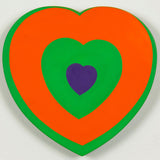
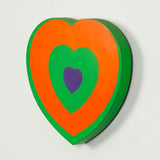
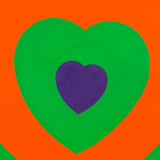
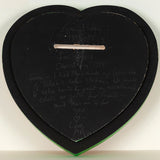
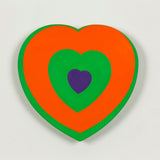
In 1967, General Idea was founded in Toronto by AA Bronson (b. 1946), Felix Partz (1945-1994), and Jorge Zontal (1944-1994). Over the course of 25 years, they made a significant contribution to postmodern and conceptual art in Canada and beyond.
The group was both prolific and multi-disciplinary long before it became de rigueur. They worked across a wide range of media including photography, sculpture, painting, mail art, video, installations, multiples, and performance.
With their interest in parody and appropriation, General Idea addressed a broad range of social (and art-world) issues such as the cult of the artist, mass media, queer identity, and consumerism.
While General Idea is not typically associated with appropriation artists (think Barbara Kruger, Jeff Koons, and Richard Prince) much of their output from the late 80s and early 90s is aligned with the Pictures Generation artists and their contemporaries. While these artists used mass-market images, notably advertising, or banal consumer goods, General Idea tinkered with fancy, Queer, or canonical images and blue-chip references.
Their most iconic work appropriated Robert Indiana’s “LOVE”. General Idea subverted his iconic work to read "AIDS" using the same font and bold color arrangement of red/green/blue as the original. But this was not the only art history hijacking General Idea did.
Using the distinguishable palette of primary red, blue, and green became a mainstay in General Idea’s work, another subtle iteration of a group self-portrait where each member declares a color.
This work is a reinterpretation of Marcel Duchamp’s iconic heart design first realized in 1936.
“Coeur Volant” is an extraordinary example of General Idea’s use of appropriation. Here Duchamp's blue and red palette is replaced with a surprising deviation from General Idea's signature palette of red, blue, and green.
This unique combination, which swaps red for a florescent orange, originates from a color study by Partz. The study was brought to life and distributed as a gift to the artist's inner circle. As with the best of their work, the colors not only represent the artists but the idea of another iconic work falling victim to contagion.
If one is unaware of the Duchamp references, or the idea of contagion and the "Image Virus" the arrangement of four “fluttering” hearts is remarkably pleasing, almost decorative. Like many of General Idea's best works, on the surface, the work can seem playful and reverential, when in fact it is conveying something cynical or sinister.
Conversely one could argue that the appropriated hearts represent something more optimistic, that the repetition of the shapes is signifying love, empathy, brotherhood, or unity.
General Idea created these hearts in a series of 4. The black-on-black version is in the permanent collection of the Art Gallery of Vancouver. The white-on-white version in the permanent collection of the Museo Ettore Fico (Turin, Italy). The blue-on-blue version, inspired by Yves Klien, has been held in a private collection in Switzerland since 2009.
Questions about this piece? Contact us or call +1.416.704.1720.
Visit our Toronto gallery on Thursdays or by appointment.
“Coeur Volant”
Canada, 1995
Acrylic, wax on heart-shaped medium-density fibreboard
Signed, dated, and inscribed, verso.
9.25"H 9.25"W 1"D
Very good condition
- Where does the inventory ship from?
Our inventory is divided between New York and Toronto.
- Where do you ship to?
We can ship anywhere. Typically when we ship within North America we prefer to use FedEx or DHL. To Europe, Asia and beyond we generally use DHL.
- How much does it cost to ship?
For shipments within North America, we typically charge a flat rate fee. Many items on our site will list the rate. For shipping outside of North America, we can easily provide a quote and will look for the most efficient and economical option.
Most of the items on our site can be easily shipped internationally.
Occasionally we will recommend that an artwork be removed from its frame for shipping. Larger framed works are typically framed with plexiglass. We export over 80% of what we sell, so we are comfortable shipping anywhere.
- Are there additional taxes or fees?
When a work is valued above $2,500 usd there is a possibility of tax of 0.35%, but this is applied sporadically. There can similarly be an additional fee for customs brokerage and this can range from $20 - $65. US Taxes, duties and customs brokerage are not included in our flat rate shipping. However most of our shipments to the US enter without any additional fees.
- Do you provide a certificate of authenticity?
Yes, we guarantee everything we sell. We can provide both a digital and printed version of our certificate of authenticity.
What is your return policy?
- Caviar20 wants you to be 100% satisfied with your purchase. We have a 7 day no-questions full refund return policy for your purchase. Shipping charges are non-refundable. Return shipping is the responsibility of the customer. After 8 days returns are given a credit note. There is no expiration for our credit notes.
- What payment methods do you accept?
Canadian clients are welcomed and encouraged to pay with interac.
